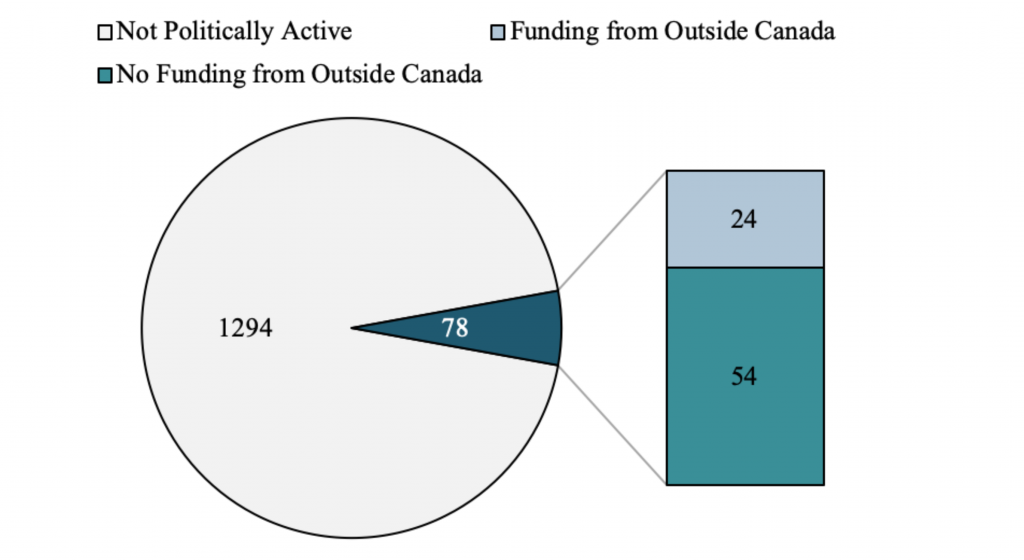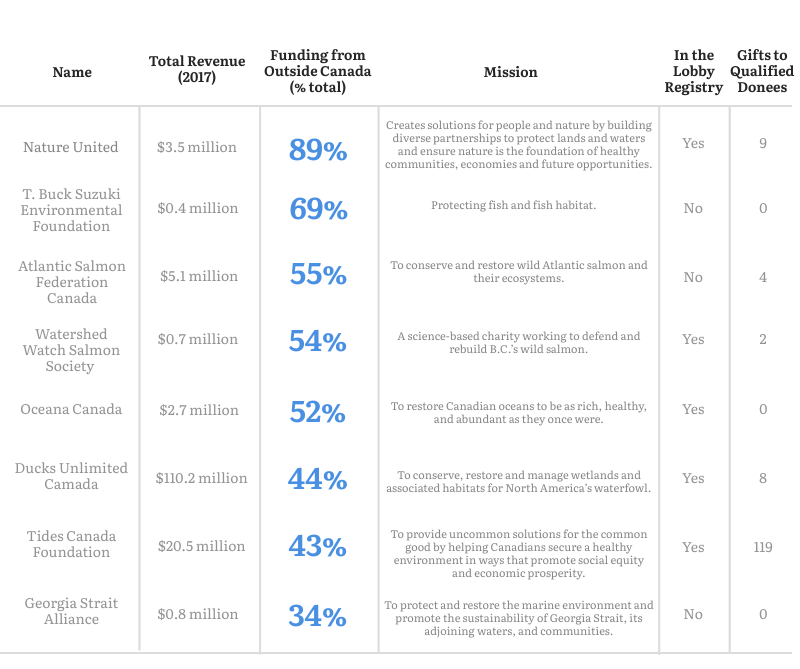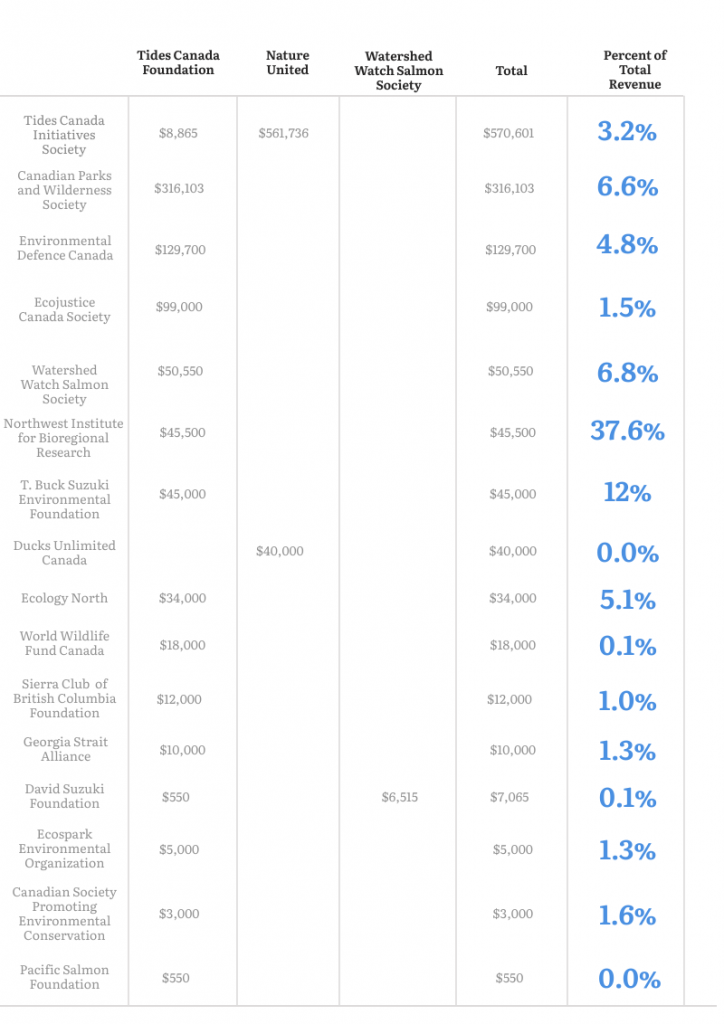In July 2019, Alberta’s newly elected United Conservative Party government launched a public inquiry into “the foreign sources of funds behind the anti-Alberta energy campaign” (Government of Alberta 2019). The inquiry’s raison d’être is based on claims of right-wing bloggers like Vivian Krause, who assert that Canada’s environmental movement is foreign-funded and -influenced. Alberta’s controversial inquiry sparked criticism from across the country, with some commentators equating it to environmental McCarthyism (Corcoran 19 September 2019). In a recent letter to the inquiry commissioner, the Edmonton-based Muttart Foundation raised concerns that the inquiry will undermine democracy by creating a climate of fear (Weber 15 November 2019).
A lot has been made of the claim that Canada’s environmental movement is bankrolled by foreign – and especially American – funders. For critics, the suggestion of foreign funding is a way to delegitimize climate activists by calling into question the extent of their public support within Canada. But how much evidence is there behind that claim, really?
Very little, as it turns out. This article provides data on foreign-funding and Canadian environmental charities. It demonstrates that the vast majority (95 percent) of environmental charities do not receive any foreign funding. It is even more uncommon for environmental charities to receive significant amounts of foreign funding. Just two percent of environmental charities receive more than one-third of their total revenue from outside Canada. Overall, funding from outside Canada makes up six percent of the sector’s revenue. The remaining 94 percent of funding for environmental charities comes from domestic philanthropic, governmental, and commercial sources.
Data and methods
In autumn 2019, I requested data from the Canada Revenue Agency (CRA) charities directorate on the annual information returns of environmental charities. The information that I received was for 2017 and 2018. While the findings were broadly similar, I focus here on the 2017 data because it is more complete.
A quick disclaimer: this dataset only covers environmental groups that are registered as charities in Canada. Many nonprofit organizations, including informal citizen groups, do not have charitable status. According to a study in Ontario, approximately a third of the sector is made up of formally incorporated not-for-profits that are not registered charities (Pollara 2013).[1] However, we are limited in finding data on these nonprofits because they do not receive tax-exempt status, and as a result are not required to file annual information disclosures. While we are thus missing a few actors in this dataset, many of the key players are present. Numerous organizations that climate deniers bemoan – Tides Canada, Y2Y, Environmental Defence Canada, and Ecojustice – are registered charities.
Foreign funding is rare for environmental charities
Canada has 1,372 environmental charities – charities that list the environment as one of their three main program areas.[2] The vast majority of environmental charities are neither politically active nor receive funding from outside Canada. In 2017, only five percent of environmental charities (62) received any funding from outside Canada.
Like other charities, most environmental charities fund themselves through a combination of domestic philanthropic, government, and commercial revenue. The top funding source for environmental charities was domestic philanthropy. On average, environmental charities received 44 percent of their funding from domestic philanthropic sources – fundraising, donations, and grants from other charities. The next largest funding source was government revenue, comprising on average 22 percent of environmental charity budgets. Finally, commercial sources of revenue like membership dues, user fees, the sale of goods, and interest made up an average of 19 percent of environmental charity revenue. In contrast, foreign funding was just two percent of environmental charity revenue, on average. The median environmental charity receives no foreign funding at all.
If it is rare for environmental charities to receive any foreign funding, it is even more uncommon for that funding to be substantial. Just two percent of environmental charities (33) receive significant foreign funding, which I define as having more than one-third of their total revenue from outside Canada. So, it is uncommon for environmental charities to receive foreign funding, and even more so for that funding to be an important source of revenue.
Environmental charities rarely carry out political activities
Very few environmental charities engaged in political activities.[3] A total of 78 environmental charities (six percent) reported political activities in their 2017 return. Environmental charities may be slightly more politically active than the charitable sector at-large: in 2015, for instance, 0.66 percent of Canadian charities reported political activities.[4] Nevertheless, the vast majority of environmental charities are not politically active.
Foreign Funding of Environmental Nonprofits

Chart 1. Proportion of Politically Active Environmental Charities with and without Funding from Outside Canada
Within the small grouping of 78 politically active environmental charities, 24 received foreign funding. Foreign funding is relatively more likely for politically active environmental charities, which is an interesting finding. This may speak to limitations that Canadian groups experience in obtaining philanthropic funding for activism. However, most of these charities do not receive very much foreign funding. The total number of environmental charities that are politically active and receive significant foreign funding is just eight – or, one percent of all environmental charities.
And of these, most are focused on fisheries, waterway, and fowl conservation. Specifically, the eight politically active charities that receive significant foreign funding are: Ducks Unlimited Canada, Tides Canada Foundation, Atlantic Salmon Federation Canada, Nature United, Oceana Canada, Georgia Strait Alliance, Watershed Watch Salmon Society, and T. Buck Suzuki Environmental Foundation.

Table 1: Politically Active Environmental Charities with Significant Foreign Funding
Environmental charities with significant foreign funding funded sixteen politically active environmental charities for a total of $1.4 million
Of course, grants given by foreign-funded Canadian environmental charities to other Canadian environmental charities would not be counted by recipient charities as funding from outside Canada. But that might still tell us something about how foreign funding influences the sector.
According to the 2017 data, foreign-funded environmental charities are usually not funders. Of the 33 environmental charities that receive significant foreign funding, only seven fund other charities (“qualified donees”). No grants were intended for political activities.[1] And most of these seven charities provided just a handful of grants, as their 2017 Qualified Donee worksheets reveal. Only Tides Canada Foundation funded more than ten organizations (119 donees in total).
In total, the environmental charities with significant foreign funding provided gifts to sixteen politically active environmental charities, totalling just $1.4 million in aggregate. Those gifts primarily came from the Tides Canada Foundation (which funded fifteen of the sixteen groups). Although the environment is a focus of Tides Canada Foundation, the organization’s funding went to an array of groups, from schools to bereavement helplines, cancer research, and food banks. Nature United funded two politically active environmental charities, while the Watershed Watch Salmon Society funded one. In all but two cases, this funding was less than a tenth of the recipient charity’s total revenue for the year.

Table 2. Funding by Environmental Charities with Significant Foreign Funding to Politically Active Environmental Charities
Smoke and mirrors
There is no evidence to support the claim that Canada’s environmental movement is foreign-owned and -influenced. Canadian environmental groups are overwhelmingly supported by domestic funding. Although there are a few environmental charities that receive significant foreign funding, these represent just two percent of the sector.
It is important to situate these findings in their broader context. The fossil fuel industry dominates environmental groups in lobbying: between 2011 and 2018 fossil fuel industry lobbyists had five times more contacts with government officials than environmental nonprofits (Graham, Carroll and Chen 2019).[9] Eighty percent of Senate lobbying on Bill C-69 – the law reforming Canada’s environmental assessment regime – was carried out by the oil and gas industry (Riley 13 June 2019). And while Canadian lobbying regulations do not require disclosures on lobbying spending, data elsewhere suggests that fossil fuel producers dramatically outspend environmental groups (Brulle 2018).
While in theory Canadian democracy might be undermined by a politically powerful group of nonprofits funded from outside Canada, this is simply not the reality. Environmental charities are overwhelmingly supported by domestic sources of funding, primarily philanthropy. Those few environmental charities that are politically active mostly do not receive foreign funding. Once we dig into the data, we find that just eight organizations are both politically active and receive significant foreign funding. Most of these groups are focused on preserving a specific species or waterway. And only five of these groups lobby government.
Simply put, the hubbub about foreign-funded environmental charities does not stand up to scrutiny. A much larger threat to democracy emanates from the political influence of fossil fuel companies, most of which are foreign-owned (Carroll and Huijzer 2018).
Want to learn more about the connections between democracy and philanthropy? Check out last month’s special edition: Philanthropy and Democracy. Foreign Funding of Environmental Nonprofits
Brulle, Robert. (2018). The Climate Lobby: a Sectoral Analysis of Lobbying Spending on Climate Change in the USA, 2000 to 2016. Climatic Change 149(3-4), 289-303.
Canada Revenue Agency. (2019). Public Policy Dialogue and Development Activities by Charities. Government of Canada, https://www.canada.ca/en/revenue-agency/programs/about-canada-revenue-agency-cra/federal-government-budgets/budget-2018-equality-growth-strong-middle-class/public-policy-advocacy-activities-charities/qa.html accessed 25 November 2019.
Carroll, William and Huijzer, M. Jouke. (2018). Who Owns Canada’s Fossil-Fuel Sector? Mapping the Network of Ownership and Control. Vancouver, BC: Canadian Centre for Policy Alternatives, https://d3n8a8pro7vhmx.cloudfront.net/parklandinstitute/pages/1656/attachments/original/1539711476/who_owns.pdf?1539711476 accessed 25 November 2019.
Corcoran, Terence. (19 September 2019). Inquiry into Foreign Funding of Anti-Alberta Energy Campaigns Could Shake Up Enviro Charities. Financial Post opinion article, https://business.financialpost.com/opinion/terence-corcoran-inquiry-into-foreign-funding-of-anti-alberta-energy-campaigns-could-shake-up-enviro-charities accessed 25 November 2019.
Government of Alberta. (2019). Public Inquiry into Anti-Alberta Energy Campaigns. Government of Alberta, https://www.alberta.ca/public-inquiry-into-anti-alberta-energy-campaigns.aspx accessed 25 November 2019.
Graham, Nicolas, Carroll, William, and Chen, David. (November 2019). Big Oil’s Political Reach: Mapping Fossil Fuel Lobbying from Harper to Trudeau. Vancouver, BC: Canadian Centre for Policy Alternatives.
Pollara. (2013). 2013 State of the Sector: Profile of Ontario’s Not-for-Profits and Charitable Organizations. Report Commissioned by the Government of Ontario Ministry of Citizenship and Immigration, https://www.ontario.ca/page/2013-state-sector-profile-ontarios-not-profits-and-charitable-organizations-volume-1-overall-report accessed 25 November 2019.
Riley, Sharon. (13 June 2019). Industry Responsible for 80 Per Cent of Senate Lobbying Linked to Bill C-69. The Narwhal, https://thenarwhal.ca/industry-responsible-for-80-per-cent-of-senate-lobbying-linked-to-bill-c-69/ accessed 25 November 2019.
Weber, Bob. (15 November 2019). ‘Anti-Albertan’ Inquiry Creates Culture of Fear, Says Longtime Edmonton Charity. CBC News, https://www.cbc.ca/news/canada/edmonton/edmonton-muttart-foundation-alberta-inquiry-1.5360598 accessed 25 November 2019.
[1] Nonprofits can also be informal and unincorporated – but these organizations tend to be small and locally-based. For these reasons, they are unlikely to receive foreign funding.
[2] Meaning that they selected G1, G2 or G3 as program area codes for at least one of the three program areas. Of these, only 780 are primarily environmental charities, meaning that they estimated that more than 50% of their programming is focused on environmental program areas. Others may have carried out environmental activities but were more focused on other program areas (such as health, education, or social services).
[3] Political activities must be non-partisan, and before 2018 could generally not exceed 10% of a charity’s resources. New rules have been issued around the political activities of charities, but the 2017 data predate these changes (Canada Revenue Agency 2019).
[4] This was, however, in a period of significant advocacy chill due to concern about the interpretation of political activities. In the late 1990s as much as 5% of the charitable sector reported political activities.
[5] Based on a search of the Government of Canada Register of Lobbyists on 25 November 2019.
[6] Based on the organizations’ 2017 T1236 Qualified Donees worksheets.
[7] Tides Canada Foundation was not in the lobby register; however, the linked Tides Canada Initiatives was.
[8] This is a specific question on the T1236.
[9] Graham, Carroll and Chen found, using data from the public lobby register, that the fossil fuel industry had 11,452 lobbying contacts with government officials between 2011 and 2018 – roughly six contacts per working day! The same study finds that environmental nonprofits had 2,399 lobbying contacts.

